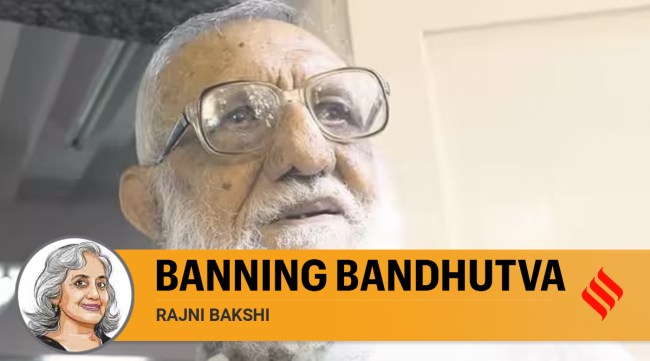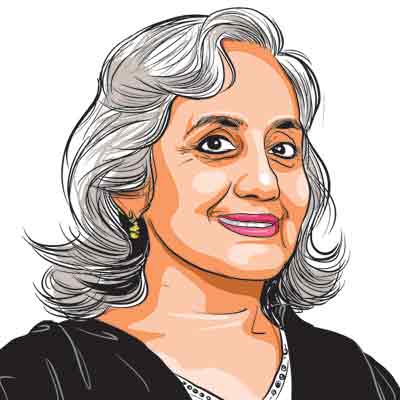Opinion Rajni Bakshi writes: When a freedom fighter and Gandhi’s great-grandson were not allowed to protest hate on Quit India Day
At least some of those in police uniform must have felt the painful irony of seeing the 99-year-old veteran who fought for freedom from the British, G G Parikh, now struggling for freedom from hate. How can making an appeal to ‘Quit Hate’ be a justification for being taken into police custody?
 At the age of 18, “G G” as he is fondly known, was arrested for joining street actions demanding that the British quit India. (File Photo)
At the age of 18, “G G” as he is fondly known, was arrested for joining street actions demanding that the British quit India. (File Photo)
There was a distinct hint of embarrassment in the eyes of the police personnel. Preventing a 99-year-old freedom fighter from holding a public meeting on Quit India Day will do that. Detaining peaceful citizens who are making a public appeal for “Hate, Quit India”, hopefully, makes many in uniform squirm. What if the future of Indian democracy now depends on such discomfort becoming more widely expressed by people at large? This is the hope that brought G G Parikh, 99, out of his home early on the morning of August 9 — the 81st anniversary of Quit India Day.
At the age of 18, “G G” as he is fondly known, was arrested for joining street actions demanding that the British quit India. Now, he was leading a motley group of citizens who wanted to free India of hate.
The plan was simple enough. We would walk in a peaceful procession from Girgaon Chowpatty to August Kranti Maidan and then hold a public meeting to celebrate the core aspiration of India’s Constitution — “bandhutva”, namely fraternity and fellow feeling.
This was not to be. Scores of police personnel were waiting at the assembly point well before G G and a few dozen activists and ordinary citizens reached. The police informed us that neither the procession nor the public meeting would be allowed. Instead, said the police officers, everyone who had assembled must go with them to the nearest police station.
But how can standing peacefully on a public footpath be an offence? How can making an appeal to “Quit Hate” be a justification for being taken into police custody?
G G, a healer and veteran Gandhian socialist activist, responded with all the elegant dignity of an untiring soldier of freedom. He quietly did a “parikrama” of the statue of Lokmanya Tilak, at Chowpatty. Then he briefly addressed those who had gathered for the peace march.
The time has come, G G said, when many more will rise up to oppose the spread of hatred and to uphold the values of the Constitution.
At least some of those in uniform must have felt the painful irony of seeing the 99-year-old veteran who fought for freedom from the British now struggling for freedom from hate. In any case, carting him off to police custody would have made for unpleasant headlines. G G was respectfully allowed to leave. But most others were loaded into the police van and held in custody for several hours before being released.
Activists Teesta Setalvad and Tushar Gandhi, who along with G G, were to speak at the planned public meeting, were prevented from even reaching the venue. Police arrived at Setalvad’s home early morning and refused to let her set out for the meeting. Tushar Gandhi, who is Mahatma Gandhi’s great-grandson, was taken to a police station near his home and held for several hours.
This small and short sequence of events may not count for much in the larger scheme of things. And yet it is a chilling portent.
As G G, and later Tushar, in a press interview, were at pains to point out — the gathering they planned was not a protest. When publicly reaffirming love, as an antidote to hate, is disallowed by the arms of the state then it is samaj itself which is in danger.
India’s struggle for freedom from British rule became possible because energy and a resolve arose from within the samaj/society. Today, the survival of a democracy that at least aspires for dignity for all, depends on that determination arising again from within the samaj.
Many ordinary citizens who want to defend their constitutional rights are also unwilling to tangle with the police or go into custody even for a few hours. Yet, without open expression of discomfort and anxiety about the spread of hate-based politics — how will the situation change?
G G Parikh is confident that this will now change, that more and more people will openly stand up for love in the face of hatred, perhaps even at risk to themselves. To the cynic, this may appear to be the wishful thinking of a man in the twilight of his life. But there are also those who know how important a role the bravery of unknown ordinary people has played at key moments in history.
Let’s dedicate the memory of that scuttled meeting to the courage of such people and the proliferation of creative public expression of “bandhutva”.
The writer is the founder of the Youtube channel Ahimsa Conversations






